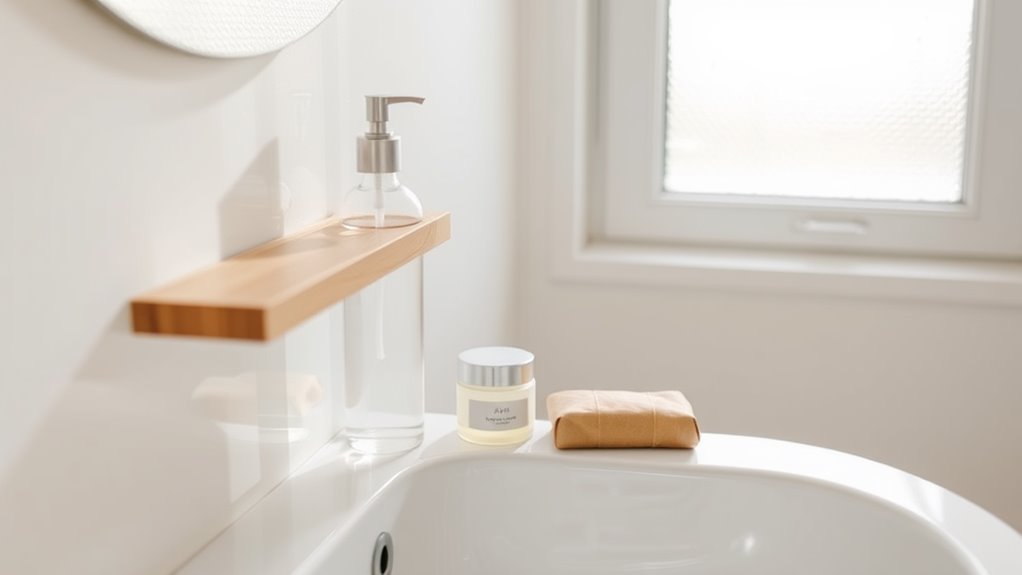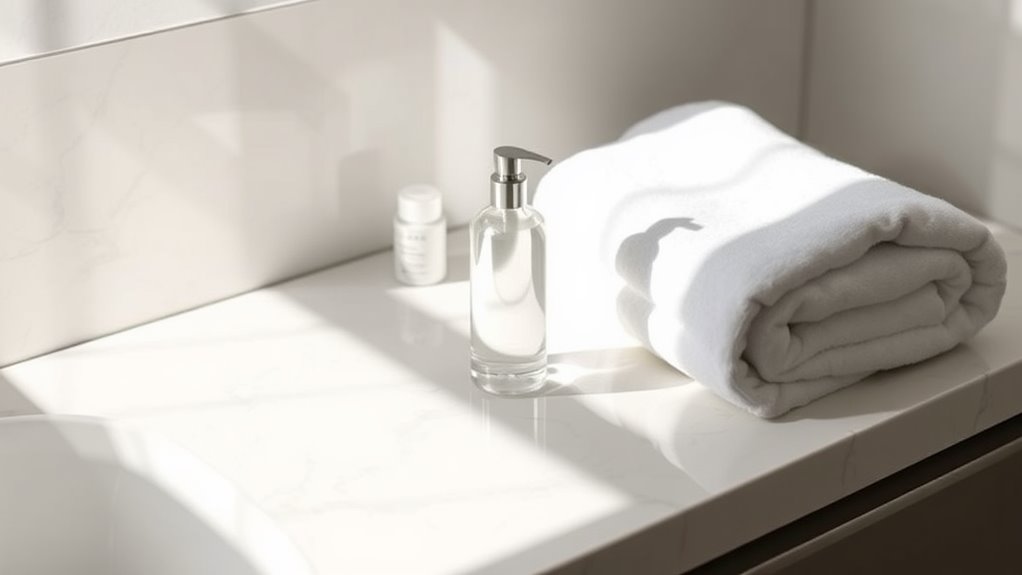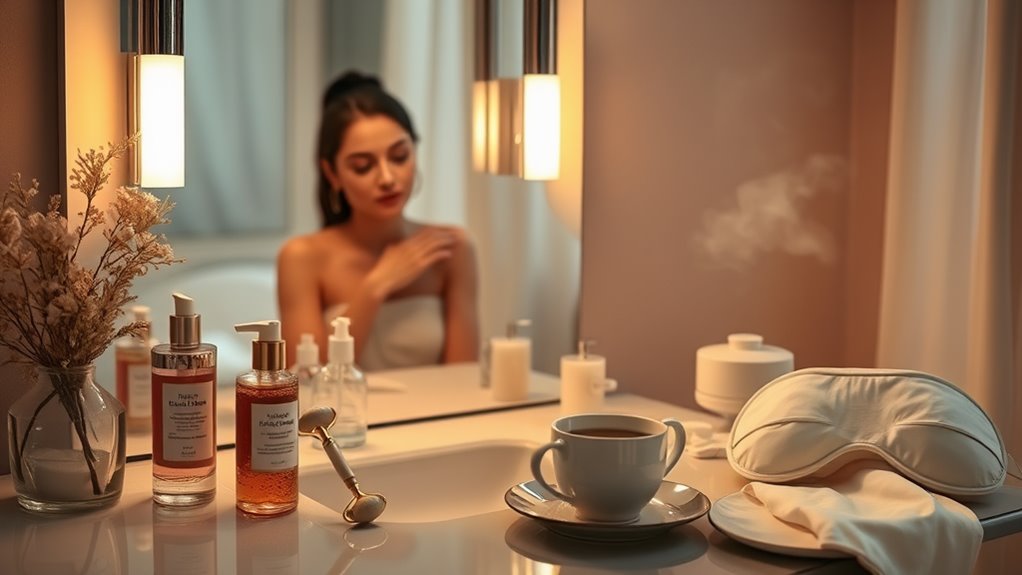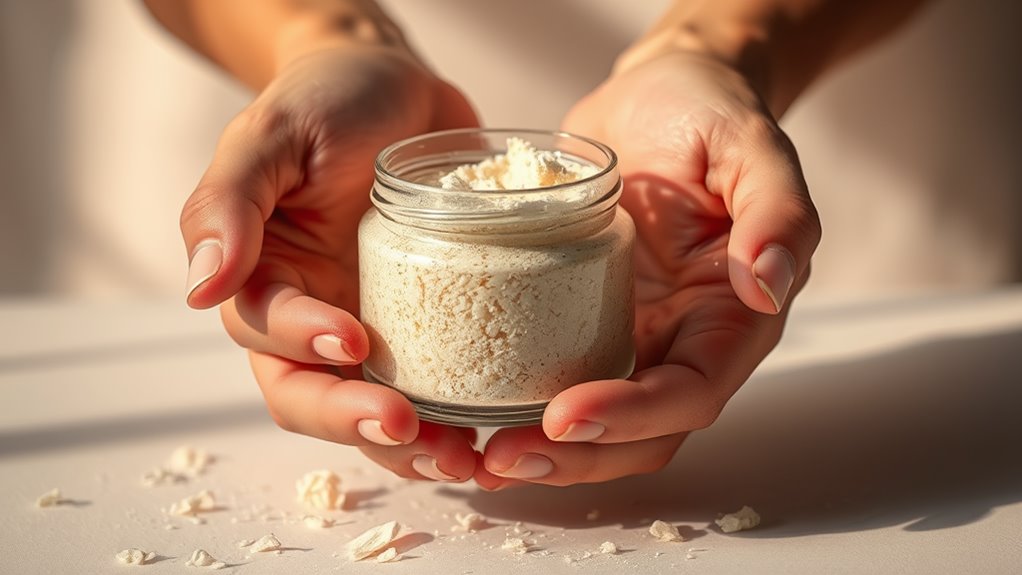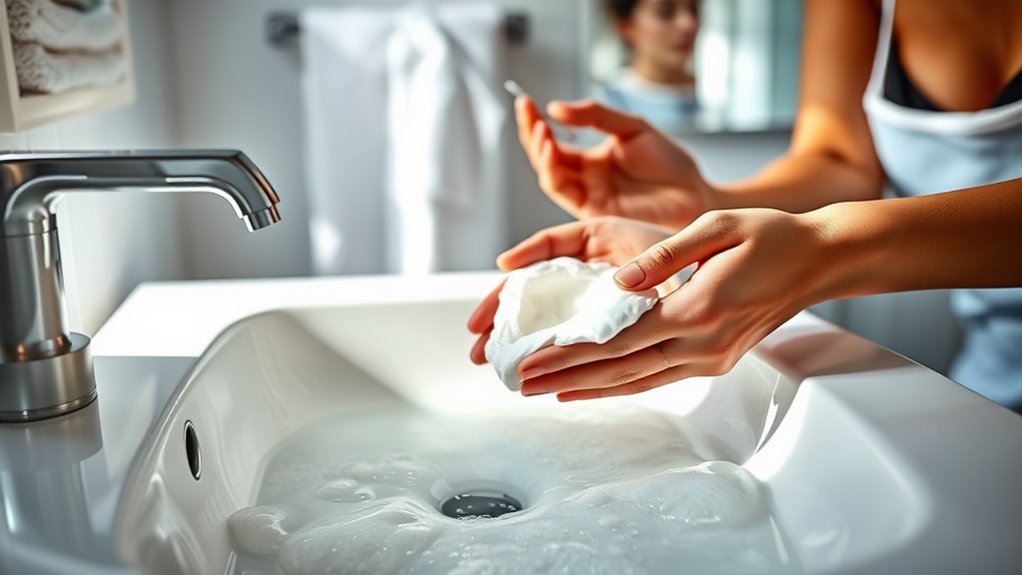Think You Need a Ton of Products. This Simple Routine Proves You Don’t
You don’t need a cabinet full of products for radiant skin. A simple routine with a gentle cleanser, moisturizer, and sunscreen can work wonders. Focus on understanding your skin type to choose the right products. Incorporate natural ingredients like aloe vera and jojoba oil for added benefits. Remember, quality over quantity matters. By embracing this minimal approach, you’ll simplify your skincare journey and achieve healthier skin. There’s plenty more to discover about enhancing your routine effectively.
Key Takeaways
- A minimal skincare routine with just a gentle cleanser, moisturizer, and sunscreen can achieve better results than using multiple products.
- Understanding your skin type is essential; it guides you in selecting the right few products for your unique needs.
- Quality over quantity is crucial; high-quality, effective ingredients improve skin health without overwhelming your regimen.
- Incorporating natural ingredients like jojoba oil and aloe vera simplifies your routine while nourishing your skin effectively.
- Targeted treatments, such as serums and spot treatments, can address specific concerns without cluttering your skincare routine.
The Myth of Multiple Products
Many people believe that using multiple skincare products is the key to achieving flawless skin, but this isn’t always the case. In fact, a minimal skincare routine can often yield better results. By focusing on just a few high-quality products, you can simplify your regimen while still addressing your skin’s needs. This approach reduces the chances of irritation and allows you to identify what truly works for you. A minimal routine typically includes a gentle cleanser, a moisturizer, and sunscreen for daytime. Embracing simplicity in your skincare not only streamlines your routine but also enhances the health of your skin. By eliminating unnecessary steps, you’re not only saving time but also money.
Understanding Your Skin Type
To create an effective skincare routine, you first need to understand your skin type.
By identifying your skin characteristics, you can determine if you have oily, dry, combination, or sensitive skin. Tailoring your routine to your specific needs will help you achieve the best results. Additionally, knowing your skin type can guide you in selecting the right skincare products that address your unique concerns.
Identifying Skin Characteristics
Understanding your skin type is essential for developing an effective skincare routine, as it allows you to choose products that cater to your specific needs.
Identifying your skin characteristics can be straightforward if you pay attention to how your skin behaves.
Consider these aspects to get started:
-
Oiliness: Notice if your skin appears shiny or feels greasy, especially in the T-zone.
-
Sensitivity: Pay attention to any redness, irritation, or reactions to products.
-
Hydration: Assess whether your skin feels tight, dry, or flaky, indicating a need for moisture.
Common Skin Types
There are five common skin types, each with unique characteristics that influence your skincare choices. Understanding your skin type is key to achieving optimal results.
| Skin Type | Characteristics | Care Tips |
|---|---|---|
| Normal | Balanced, few imperfections | Use mild products |
| Oily | Shiny, enlarged pores | Opt for oil-free formulas |
| Dry | Flaky, tight, or rough texture | Hydrate and moisturize |
| Combination | Oily in some areas, dry in others | Balance treatments |
| Sensitive | Prone to redness and irritation | Choose gentle products |
Identifying your skin type helps you make informed choices, ensuring you’re using the right products for your unique needs. Master this knowledge to elevate your skincare routine.
Tailoring Your Routine
When you recognize your skin type, it becomes easier to tailor your skincare routine for the best results.
Understanding whether you have oily, dry, or combination skin is crucial for selecting the right products.
Here’s how to customize your approach:
-
Oily Skin: Opt for lightweight, oil-free moisturizers and exfoliating acids to control shine.
-
Dry Skin: Use rich, hydrating creams and nourishing oils to restore moisture and protect your barrier.
-
Combination Skin: Balance your routine with a mix of lightweight and richer products, targeting each area accordingly.
The Power of Cleanser
Choosing the right cleanser is crucial for your skincare routine, as the ingredients play a significant role in how your skin responds.
You’ll want to apply it using proper techniques to ensure you’re effectively removing dirt and impurities.
Let’s explore what makes a cleanser powerful and how to use it for maximum benefits. Additionally, understanding your specific skin type can help you select the most effective cleanser for your needs.
Essential Ingredients Matter
To achieve healthy, glowing skin, the cleanser you use plays a crucial role in your routine. Selecting a cleanser with essential ingredients can transform your skin health. Here’s what to look for:
-
Hydrating agents like hyaluronic acid to maintain moisture levels.
-
Gentle exfoliants such as glycolic acid to remove dead skin without irritation.
-
Antioxidants like vitamin C to protect against environmental damage.
These ingredients not only cleanse but also enhance your skin’s texture and radiance.
A well-formulated cleanser sets the foundation for the rest of your skincare regimen, ensuring that active ingredients penetrate effectively.
By prioritizing quality over quantity, you’ll find that a simple routine can yield powerful results.
Embrace the essence of effective cleansing to elevate your skincare game.
Proper Application Techniques
Although you may have the right cleanser, how you apply it can significantly impact its effectiveness.
Start with damp skin; this helps the cleanser spread more easily and penetrate better. Use a pea-sized amount, warming it between your fingers before application.
Gently massage the cleanser onto your face in circular motions for about 30 seconds, focusing on areas where dirt accumulates, like the nose and forehead.
Don’t scrub; let your fingertips do the work to avoid irritation. Rinse thoroughly with lukewarm water, ensuring no residue remains.
Finish by patting your skin dry with a clean towel. Master these techniques, and you’ll elevate your cleansing routine, ensuring your skin benefits fully from the products you choose.
The Importance of Moisturizer
Moisturizer is a vital component of any skincare routine, acting as a protective barrier that keeps your skin hydrated and healthy.
Without it, your skin can become dry, irritated, and more prone to damage. By incorporating moisturizer, you not only enhance your skin’s texture but also support its overall function.
Consider these key benefits:
-
Hydration: It locks in moisture, preventing dryness and flakiness.
-
Barrier Repair: It strengthens the skin’s natural barrier, protecting against environmental stressors.
-
Youthful Appearance: Well-moisturized skin looks plump and radiant, reducing the appearance of fine lines.
Additionally, avoiding common moisturizing mistakes can ensure that you maximize the benefits of your moisturizer for optimal skin health.
The Role of Sunscreen
Sunscreen is an essential step in your skincare routine that shouldn’t be overlooked. It protects your skin from harmful UV rays, which can lead to premature aging, sunburn, and even skin cancer.
Applying a broad-spectrum sunscreen with at least SPF 30 daily shields your skin, whether you’re indoors or outdoors. Don’t wait until summer; UV exposure can occur year-round.
Make it a habit to apply sunscreen as the last step in your morning routine, ensuring you cover all exposed areas, including your face, neck, and ears.
Remember to reapply every two hours, especially if you’re sweating or swimming. Incorporating sunscreen into your daily regimen isn’t just smart; it’s crucial for maintaining your skin’s health and longevity. Sunscreen is your skin’s best defense against harmful UV rays, making it a non-negotiable part of your routine.
Targeted Treatments: Less Is More
While protecting your skin from UV rays is vital, targeting specific skin concerns can enhance your skincare routine even further.
Instead of layering multiple products, focus on a few potent treatments that address your unique needs. This approach not only simplifies your regimen but also maximizes results.
Consider incorporating:
- Serums: Concentrated formulas that tackle issues like dark spots or fine lines.
- Spot Treatments: Targeted solutions for breakouts or blemishes, applied directly to affected areas.
- Eye Creams: Specialized products to reduce puffiness and dark circles, enhancing your overall appearance.
The Benefits of Exfoliation
Exfoliation is a game-changer for your skincare routine, as it removes dead skin cells and reveals a brighter, smoother complexion.
By sloughing off these impurities, you enhance skin texture and promote cell turnover, which can help reduce the appearance of fine lines and hyperpigmentation.
Regular exfoliation also unclogs pores, minimizing the likelihood of breakouts and allowing your other products to penetrate more effectively.
You’ll notice that your serums and moisturizers work wonders after you’ve exfoliated, maximizing their benefits.
Plus, it boosts blood circulation, giving your skin a healthy glow.
Aim for gentle exfoliation a few times a week, depending on your skin type, and watch your complexion transform.
Embrace this essential step for radiant, rejuvenated skin!
Embracing Natural Ingredients
When you embrace natural ingredients in your skincare routine, you unlock a world of benefits for your skin.
A minimalist approach not only simplifies your regimen but also allows you to appreciate the power of nature.
Plus, experimenting with DIY natural remedies can lead to personalized solutions that cater specifically to your skin’s needs.
Benefits of Natural Ingredients
Embracing natural ingredients in your skincare routine offers a wealth of benefits that go beyond mere aesthetics. By choosing products derived from nature, you’re not just pampering your skin; you’re also supporting its overall health.
Here are some key advantages:
-
Gentle on Skin: Natural ingredients often have fewer irritants, making them suitable for sensitive skin types.
-
Nutrient-Rich: They’re packed with vitamins, antioxidants, and minerals that nourish and protect your skin.
-
Environmentally Friendly: Opting for natural products reduces chemical waste, promoting sustainability in your beauty routine.
Incorporating these elements can lead to healthier skin while aligning with eco-conscious practices.
You’ll find that simplicity, combined with nature’s best, can transform your skincare experience.
Minimalist Skincare Approach
A minimalist skincare approach focuses on simplicity and effectiveness, making it an ideal way to harness the power of natural ingredients. By limiting the number of products, you allow your skin to breathe and absorb nutrients more efficiently. Here’s a quick guide to essential natural ingredients you can incorporate:
| Ingredient | Benefits | Usage |
|---|---|---|
| Jojoba Oil | Moisturizes, balances oil | Use as a daily moisturizer |
| Aloe Vera | Soothes, hydrates | Apply as a calming gel |
| Honey | Antibacterial, humectant | Use in masks or cleansers |
| Coconut Oil | Nourishes, protects skin | Use for deep hydration |
| Green Tea | Antioxidant, anti-inflammatory | Brew as a toner |
Embrace these essentials for a fresh and effective routine!
DIY Natural Remedies
Creating your own DIY natural remedies can be a rewarding way to enhance your skincare routine while ensuring you use pure, effective ingredients.
By incorporating simple, natural elements, you can target specific skin concerns without the clutter of commercial products.
Here are three easy recipes to get you started:
-
Honey and Sugar Scrub: Combine equal parts honey and sugar for an exfoliating treatment that moisturizes while removing dead skin cells.
-
Aloe Vera Gel: Use fresh aloe vera leaves for a soothing, hydrating gel that calms irritation and promotes healing.
-
Green Tea Toner: Brew green tea, cool it, and apply it as a toner to minimize pores and reduce inflammation.
Embrace these natural solutions, and you’ll master the art of DIY skincare.
Building a Routine That Works
When you want to build a skincare routine that works for you, it’s essential to consider your unique skin type and concerns. Start by identifying whether your skin is oily, dry, sensitive, or combination.
Next, choose products that address your specific needs—cleansers, moisturizers, and treatments should align with your goals. For instance, if you struggle with acne, opt for non-comedogenic products containing salicylic acid.
Keep your routine simple; you don’t need a dozen products. Focus on quality over quantity. Establish a morning and evening regimen, incorporating gentle cleansing, hydration, and sun protection during the day.
Consistency is key, so stick to your routine and adjust as necessary. Mastering this process will lead to healthier, more radiant skin over time.
Listening to Your Skin
Many people overlook the importance of tuning into their skin’s needs. Understanding what your skin craves can lead to a more effective skincare routine.
Start by paying attention to your skin’s signals.
-
Dryness: If your skin feels tight or flaky, it’s crying out for hydration.
-
Oiliness: Excess shine could mean it’s time to lighten your products or focus on balancing oils.
-
Irritation: Redness or sensitivity may indicate a product is too harsh or that your skin needs soothing ingredients.
Simplifying Your Skincare Journey
Listening to your skin helps you identify what it truly needs, setting a strong foundation for a simplified skincare routine. By focusing on a few key products, you can streamline your regimen and achieve optimal results. Start with a gentle cleanser, a hydrating moisturizer, and a broad-spectrum sunscreen.
| Step | Product Type | Purpose |
|---|---|---|
| Morning | Cleanser | Remove impurities |
| Morning | Moisturizer | Hydrate and protect |
| Morning | Sunscreen | Shield against UV damage |
